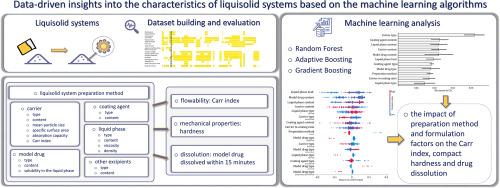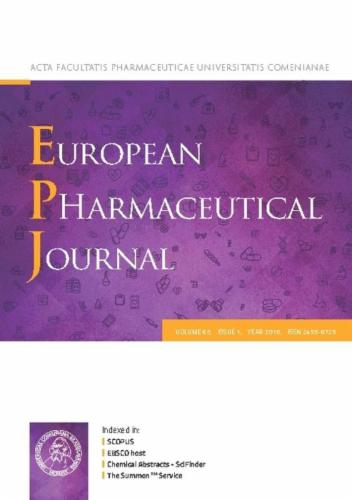Data-driven insights into the properties of liquisolid systems based on machine learning algorithms
IF 4.3
3区 医学
Q1 PHARMACOLOGY & PHARMACY
引用次数: 0
Abstract
Liquisolid systems (LS) represent a formulation approach where liquid drug or its dispersion is transformed into a powder with good flowability and compactibility, leading to enhanced drug dissolution and bioavailability. Many research groups have focused on the preparation and investigation of LS, leading to a higher need for comprehensive evaluation of factors impacting LS characteristics. The aim of this work was to investigate the applicability of machine learning algorithms in the LS evaluation, using data mined from published literature, and provide an insight into critical factors governing the liquisolid system performance.
The dataset was prepared using publication search engines and relevant keywords, with a total of 425 formulations included in the database. The database focused on preparation methods, formulation parameters, and liquisolid system characteristics. Subsequently, critical properties of the liquisolid system, i.e. flowability, compact hardness, and drug dissolution, were analyzed using machine learning algorithms, including Gradient Boosting, Adaptive Boosting and Random Forest.
In addition to conventional preparation methods and excipients, novel technologies (fluid bed preparation, extrusion/spheronization) and materials (Neusilin®, Fujicalin®, and Syloid®) enhanced the properties of liquisolid systems. The analysis revealed that formulation factors, such as carrier and coating agent type and content, liquid phase load, model drug type and content, as well as preparation method, significantly influenced liquisolid system characteristics. The models developed exhibited high prediction accuracy when applied on test data (higher than 80 %). This indicates that the machine learning models may provide an insight into the critical attributes affecting the LS performance and may be used as a valuable tool in the development and optimization of these samples.

基于机器学习算法,以数据为驱动,深入了解液固系统的特点。
液态固态系统(Liquisolid systems,LS)是将液态药物或其分散体转化为具有良好流动性和致密性的粉末,从而提高药物溶解度和生物利用度的一种制剂方法。许多研究小组都将重点放在了 LS 的制备和研究上,因此更需要对影响 LS 特性的因素进行综合评估。这项工作旨在利用从已发表文献中挖掘的数据,研究机器学习算法在液态固体评价中的适用性,并深入了解影响液态固体系统性能的关键因素。数据集是利用出版物搜索引擎和相关关键词编制的,数据库中共包含 425 种配方。数据库重点关注制备方法、配方参数和液固体系特性。随后,使用梯度提升、自适应提升和随机森林等机器学习算法分析了液固体系的关键特性,即流动性、致密硬度和药物溶出度。除了传统的制备方法和辅料外,新型技术(流化床制备、挤压/球化)和材料(Neusilin®、Fujicalin® 和 Syloid®)也增强了液态固体体系的性能。分析表明,载体和包衣剂类型及含量、液相负载、模型药物类型及含量以及制备方法等配方因素对液态固体体系的特性有显著影响。所开发的模型在应用于测试数据时表现出较高的预测准确率(高于 80%)。这表明机器学习模型可以帮助人们深入了解影响液相固体性能的关键属性,并可作为开发和优化这些样品的重要工具。
本文章由计算机程序翻译,如有差异,请以英文原文为准。
求助全文
约1分钟内获得全文
求助全文
来源期刊
CiteScore
9.60
自引率
2.20%
发文量
248
审稿时长
50 days
期刊介绍:
The journal publishes research articles, review articles and scientific commentaries on all aspects of the pharmaceutical sciences with emphasis on conceptual novelty and scientific quality. The Editors welcome articles in this multidisciplinary field, with a focus on topics relevant for drug discovery and development.
More specifically, the Journal publishes reports on medicinal chemistry, pharmacology, drug absorption and metabolism, pharmacokinetics and pharmacodynamics, pharmaceutical and biomedical analysis, drug delivery (including gene delivery), drug targeting, pharmaceutical technology, pharmaceutical biotechnology and clinical drug evaluation. The journal will typically not give priority to manuscripts focusing primarily on organic synthesis, natural products, adaptation of analytical approaches, or discussions pertaining to drug policy making.
Scientific commentaries and review articles are generally by invitation only or by consent of the Editors. Proceedings of scientific meetings may be published as special issues or supplements to the Journal.

 求助内容:
求助内容: 应助结果提醒方式:
应助结果提醒方式:


